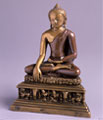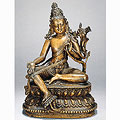 |
|
 |
 |
 |
 |
 |
 |
 |
 |
Sculpture from Tibet
Buddhism was introduced into Tibet by the 7th century, and by the end of the 8th century, had been proclaimed the state religion. Buddhist influence waned, however, during persecutions that occurred between 838 and 842. In the late 10th century, changes in political power led to a resurgence of the religion and monks from Tibet were sent abroad to India to study and Indian scholars were invited to Tibet to give teachings. It was at this time that Tibet received much artistic stimulus from India as well as enormous quantities of Buddhist texts. The type of Buddhism practiced in Tibet is known as Vajrayana or Esoteric Buddhism and is one which is based on a belief in the possibility of swift progress towards enlightenment. Tibet's vast geographic area and its many adjacent neighbors -- India and Kashmir, Nepal, the northern regions of Burma (Myanmar), Central Asia, and China -- are reflected in the rich stylistic diversity of the Tibetan sculptures in the Asia Society's collection. The greatest influx of teachers, texts, and, artistic imagery, however, came from the regions of Pala-ruled eastern India beginning in the 10th century and, to a lesser extent, from Kashmir in the west. This influence lasted through the late 12th and 13th centuries when Buddhism almost completely ceased to be practiced in India as a consequence of Muslim invasions and the growth of Hinduism. |
 |
 |
| 1 thru 5 of 5 |
 |
| view text only list |
 |

Goddess |
 |

Bodhisattva |
 |

Bodhisattva Manjushri |
 |

Buddha Shakyamuni |
 |

Bodhisattva Avalokiteshvara |
 |
|
 |